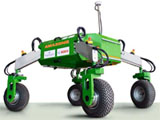Agricultural and Biological Systems Engineering, Department of

Department of Agricultural and Biological Systems Engineering: Faculty Publications
Document Type
Article
Date of this Version
1-7-2023
Citation
Smart Agricultural Technology 4 (2023) 100176. https://doi.org/10.1016/j.atech.2023.100176
Abstract
Irrigation water management using automated irrigation decision support system (IDSS) as a smart irrigation scheduling tool can improve water use efficiency and crop production, especially under circumstances of limited water supply. The current study evaluated the performance of different artificial intelligence (AI) algorithms and their ensembles in forecasting Crop Evapotranspiration (ETc) and Crop Water Stress Index (CWSI) against calculated single crop coefficient FAO56 ETc and Jackson’s theoretical CWSI, respectively. Soil moisture, canopy temperatures (Tc) and Normalized Difference Vegetation Index (NDVI) were all measured from irrigated and non-irrigated maize plots in West Central Nebraska during 2020 and 2021 growing seasons. There were fifteen and twelve input combinations used for ETc and CWSI predictions, respectively, having input variables such as weather and soil moisture as well as ancillary variables, including NDVI, reference evapotranspiration (ETr), and cumulative growing degree days (CGDDs). While evaluating the models, four statistical performance indicators including coefficient of determination (r2), root mean square error (RMSE), mean absoluter error (MAE), and mean absolute percentage error (MAPE) were used. Furthermore, ranking scores were performed on statistical results to find the overall best model across all the input combinations. Based on total ranking scores, CatBoost (RMSE ranging between 0.06 – 0.09 unitless) was the best model in predicting CWSI, while Stacked Regression (RMSE ranging between 0.27 – 0.72 mm d-1) was the best model for ETc estimation. Future research will consider designing and evaluating an IDSS using identified best machine learning models to establish soil water and plant stress feedback for automated irrigation scheduling.
Included in
Bioresource and Agricultural Engineering Commons, Environmental Engineering Commons, Other Civil and Environmental Engineering Commons


Comments
Open access.